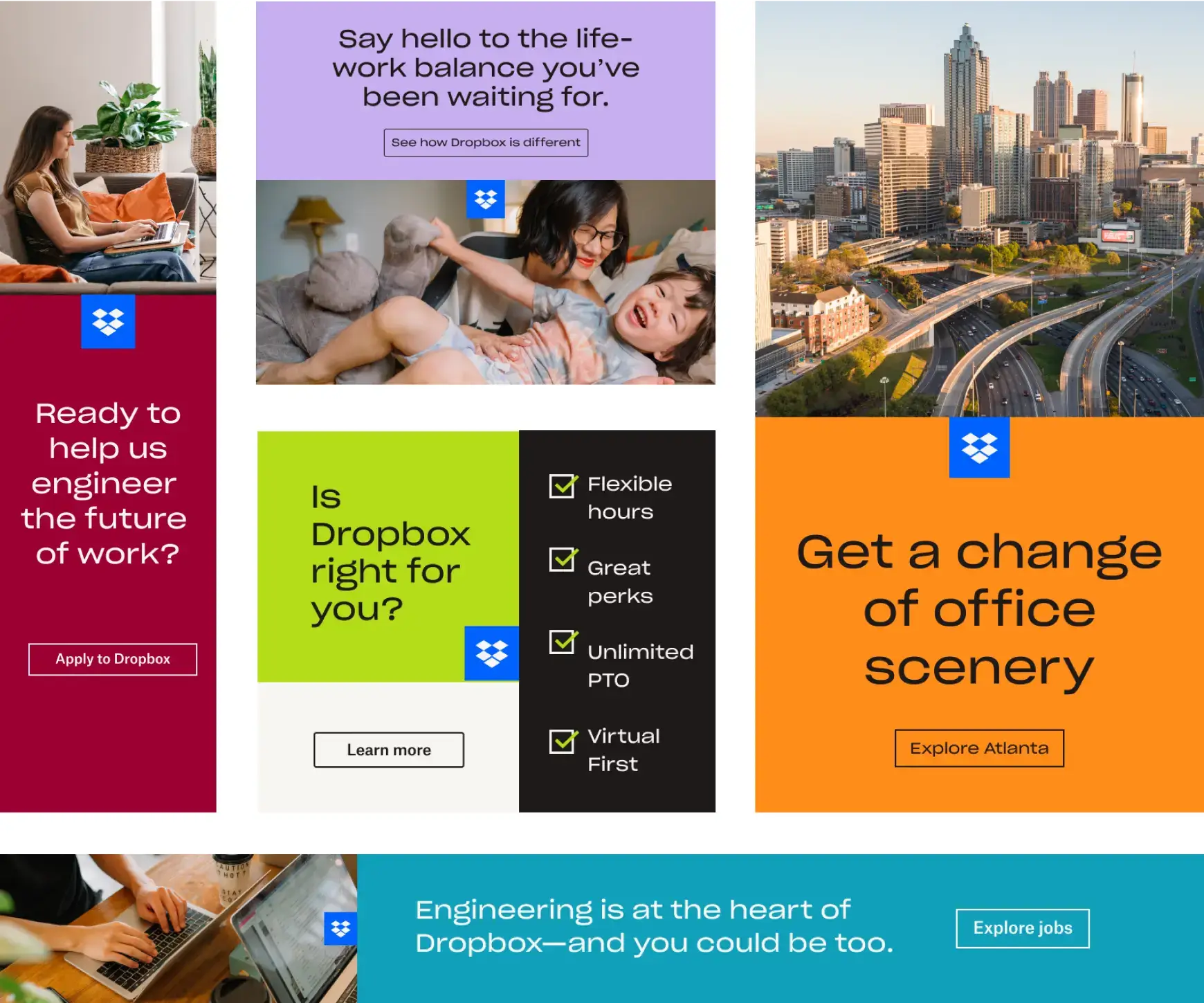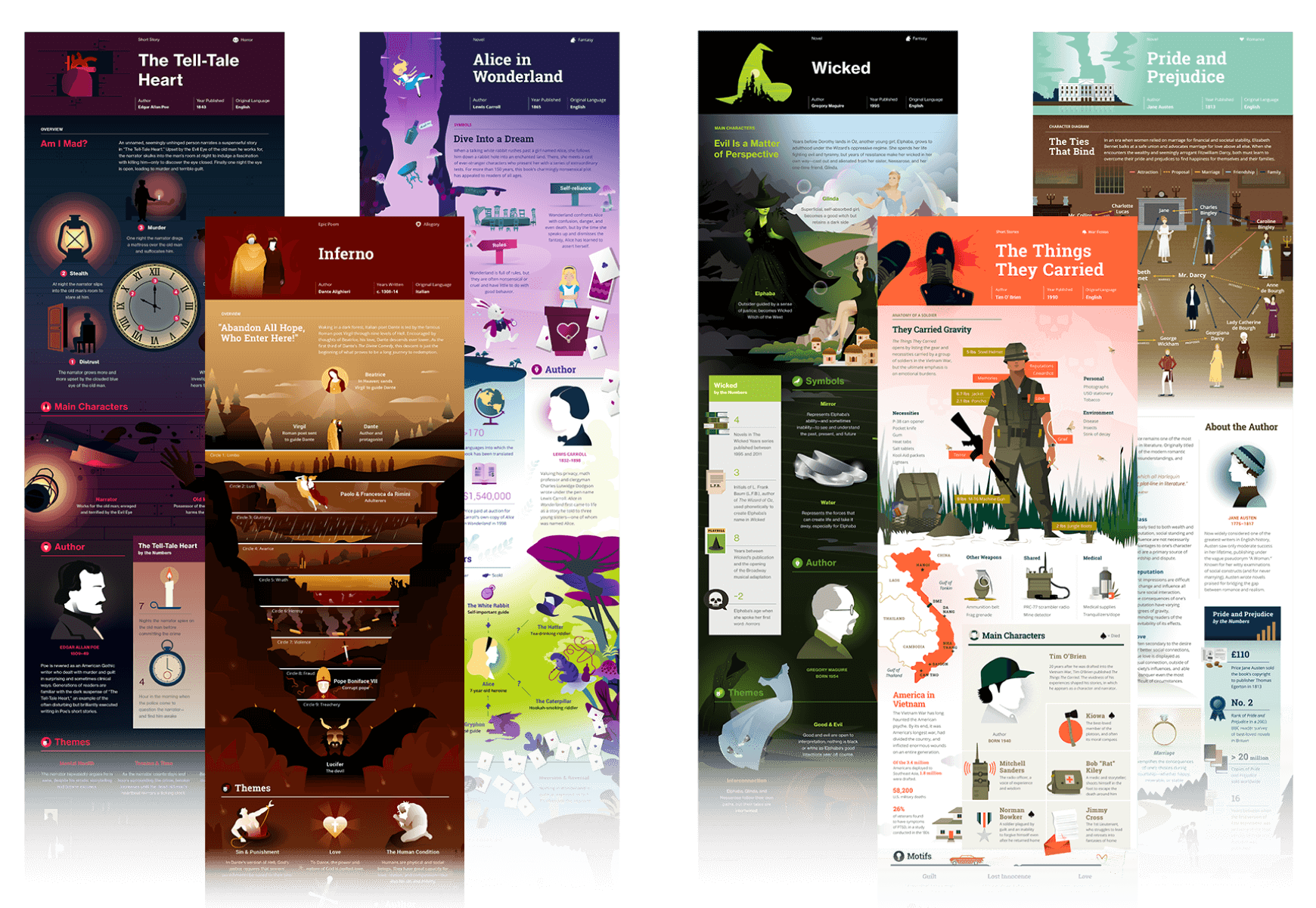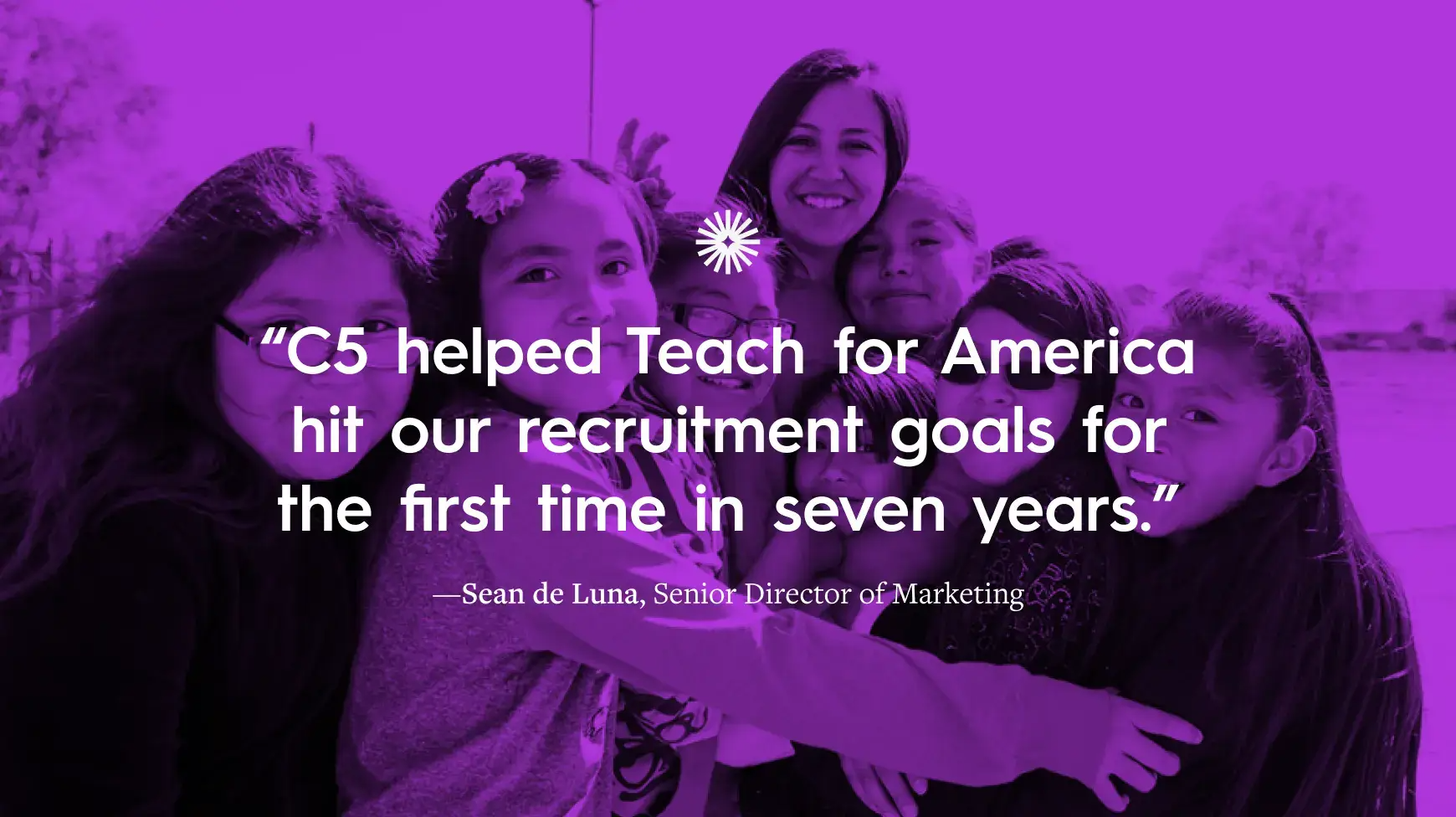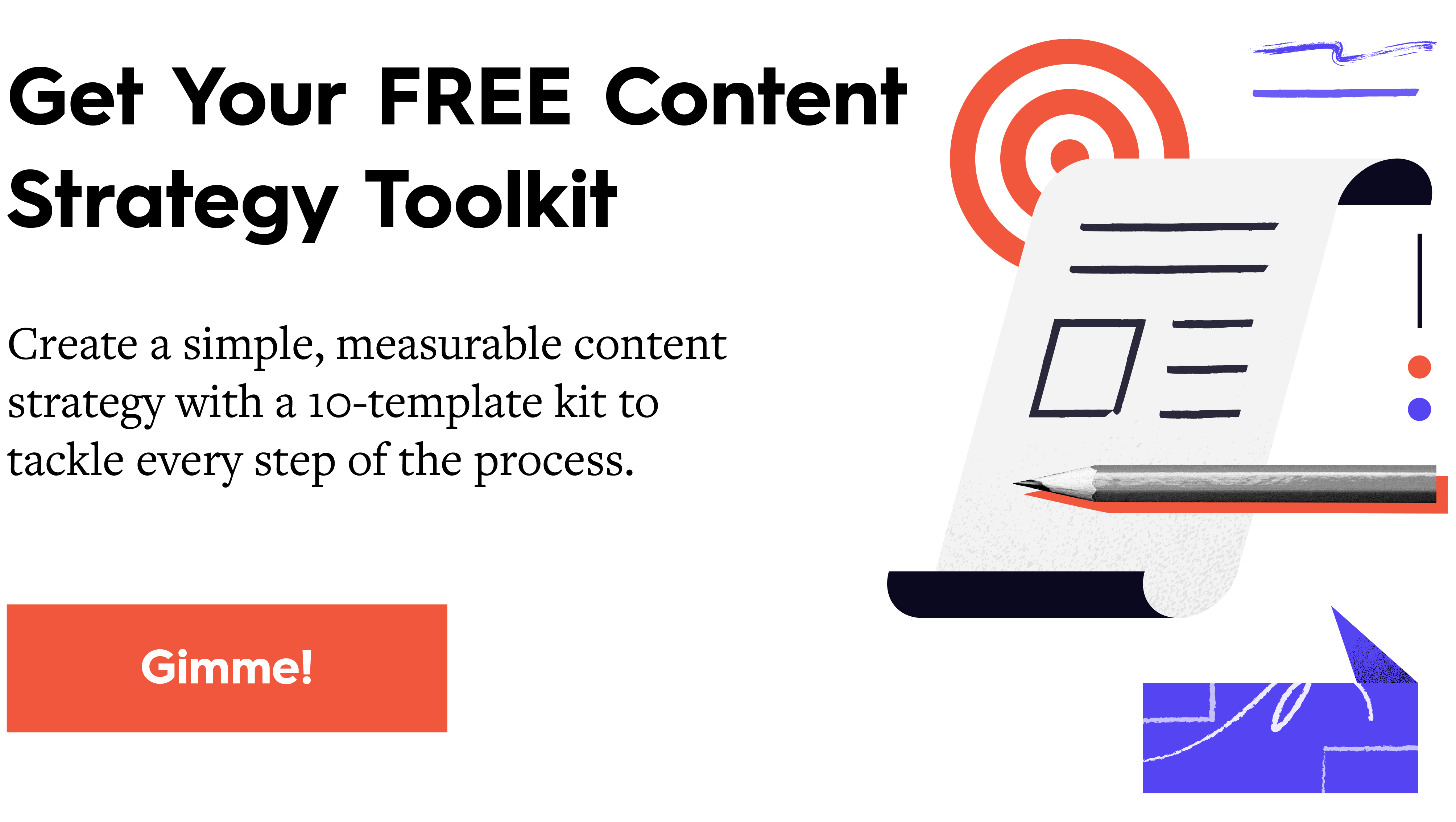From AI to analytics, content marketers have more tools to succeed than ever before. But you can only get the best results if you’re working with a solid content marketing strategy from the start.
Having been in the content marketing game for well over a decade, we’re often surprised to see the same problems plague our clients, whether they’re smaller startups or Fortune 500 behemoths.
- They aren’t aligned around the same goals.
- They struggle to understand their audience.
- They don’t create effective content.
- They can barely get any piece of content out the door.
The problems go on and on, but once we dig into their content marketing operation, we generally find that these problems stem from one, or two, or five things that are wrong with their core content strategy.
Luckily, some of the biggest problems can be solved by the simplest fixes—and we can give them to you. So, whether you’re dealing with recurring challenges or one big blocker, here’s how you can break through and get back on the right track.
How to Fix the Top 15 Content Marketing Strategy Mistakes
If you’re guilty of one (or all) of these common mistakes, don’t get down on yourself. We know about these firsthand because we’ve been guilty of them too. But we also hope you’ll right these wrongs, put our tips to work, and come out on top with your next killer case study.
Mistake 1: Not Documenting Your Strategy
If you’re working with a small team, small budgets, and a long to-do list, it can seem inconvenient to stop and document your strategy. But keeping it “in your head” doesn’t do anyone any good.
Only 44% of enterprise content marketers have a documented content strategy.
—Content Marketing Institute
This is a sad statistic, but it’s not surprising, as we see too many clients come to us without a clear strategy on paper. It’s also no surprise that they struggle to work effectively or get the results they want. But the #1 thing you can do to completely transform your marketing is document your strategy. (Trust us, by tweaking our strategy on paper, we increased sales 160%.)
The fix: Download our free content strategy toolkit, then grab your core team, dig into your historical data, and work through the steps in our guide to create a content strategy. We’ve perfected the process to ensure you walk away with a solid, cohesive strategy that will help you achieve the goals you want.
Mistake 2: Working Without Personas
If the content you create isn’t collectively moving you toward your goal, it’s not the content’s fault. Oftentimes, weak content happens because you don’t know who you’re trying to create content for.
The #1 challenge B2B marketers face is creating the right content for their audience.
—Content Marketing Institute
We harp on this all the time—and for good reason.
- Who is your audience?
- What do they need?
- What do they care about?
- What motivates them?
It’s important to do the footwork to get inside your audience’s minds so you know how to tailor your content to them.
For example, when Dropbox asked us to help revamp their employer brand, we dove into audience insights to understand how to position the brand to potential employees. With a revised campaign, we were able to help Dropbox increase brand perception 7%.
The fix: Talk to your potential customers, ask questions, and get inside their minds. (If you’re not sure who your audience is, here’s how to find them.) Once you have a clear picture, you can use our guide to create personas and ideal customer profiles. Going forward, anytime you have a content idea, use your personas/ICPs to vet your ideas or refine them to make them more compelling.
(BTW, personalization can do a lot to make your audience feel seen. Find out how to use AI to add more personalization throughout the buyer journey.)
Mistake 3: Content Isn’t Tied to a Goal
Too much content out there is total fluff, overly salesy, or completely random. There’s no cohesive story or supporting message. To be truly effective, every piece of content should directly map to a goal.
The fix: Follow these tips to set clear, measurable goals that will get results.
Mistake 4: Not Including the Right Stakeholders from the Beginning
You might be excited to hit the ground running with your strategy, but a content marketing operation requires a lot of people—and they all have different opinions and perspectives. We can’t tell you how many times we’ve made it to the finish line with a project, only to be sabotaged by a barrage of last-minute adjustments from late-stage shotcallers.
41% of B2B marketers cite workflow issues/content approvals as a key challenge when creating content.
—Content Marketing Institute
Feedback is not a problem inherently, but when people drop in with their opinions in the final stage (having often not reviewed the project goals), content often gets watered down or altered so significantly it no longer serves its original purpose.
The fix: Build solid timelines with built-in review stages. Don’t go on to the next stage of production until you have sign-off from all relevant parties. (If you’re not sure who needs to be involved in what, here’s what an ideal content marketing team looks like.)
Remember: It’s important to get overall strategy buy-in from higher-ups before you even start to create content. The more you can involve people in the vision, the easier it will be to get the budget for that new video or design time for those social ads.
Mistake 5: Making Scattershot Content
This is probably the number one problem we see when brands pursue content marketing. They may get excited about a certain project or format, but their overall content is created and published inconsistently.
54% of B2B marketers struggle with creating content consistently, and 44% struggle with creating quality content.
—Content Marketing Institute
While a one-off piece might work if you’re lucky, you need a cohesive content plan that provides true value to your audience regularly.
The fix: Instead of publishing piecemeal content when you can get around to it, break your strategy down into content campaigns centered around a core message or theme. Use our brand messaging framework to make sure you’re tailoring the right message for each audience.
Mistake 6: Trying to Do It All Yourself
Year after year, marketers are asked to do more with less. Whether it’s a shifting economy, industry issues, or company challenges, marketers are always having to tighten their belts.
55% of B2B marketers are working with the same budget (or a decrease).
—Content Marketing Institute
This means you have to be as smart as possible with your time and your budget. Fortunately, as AI technology has come on the scene, there are more ways to increase your productivity and reduce your workload by employing AI tools to help in everything from content creation to automation.
A lack of resources is the #1 challenge facing B2B marketers today. But 72% have begun to use generative AI tools.
—Content Marketing Institute
The fix: Review your tech stack to see what tools you’re using, and what tools you might add to the mix. (Here are 50+ content marketing strategy tools to help you work more effectively, plus 30 AI hacks to work more effectively.)
Mistake 7: Not Measuring or Not Measuring Correctly
This is one of our biggest pet peeves, and we see it over and over (even in our clients). You can’t make any clear progress if you have no benchmarks—and you certainly can’t demonstrate your ROI if you don’t track your results.
The fix: Try this 3-step process to choose the right metrics for your goals, and double-check that you have the correct infrastructure in place to measure. (Trust us, we have spent more time than we’d like on the phones with reps to get the right tech on our site.)
Mistake 8: Refusing to Change
When you’ve put the work into a content strategy, it’s frustrating to change course halfway through when you realize it’s too unrealistic. But if there’s anything we’ve learned in the last decade of marketing, it’s that things change—and they change quickly (hi, pandemic!).
The fix: It’s important to review your strategy regularly to ensure it aligns with your current goals and market conditions. A good strategy provides a firm foundation with the flexibility to scale. If you prefer to run lean, consider taking a moonshot approach to crafting a strategy. We used this to tweak our own content—and increased our leads 78% in 6 months.
Mistake 9: Missing Easy Opportunities
It’s easy to get tunnel vision when you work on your own brand day in and day out. (Again, we’re guilty of this too.) But it’s important to take a critical look at not only your own strategy but your competition’s strategy too. We can’t tell you how many times a simple competitor audit has surfaced surprising insights into areas a client can easily make a play.
The fix: You should always be looking for gaps to fill in your content strategy, as well as easy plays to get visibility. Start with our guide to find the best keywords to target (including low-hanging fruit your competitors aren’t targeting). You can also conduct a content audit to identify gaps in your own marketing mix, as well as subjects your competitors are covering.
Mistake 10: A Weak Production Pipeline
Content marketing takes a lot of work, but without the right resources, skills, or infrastructure to produce it, it’s nearly impossible to create quality content consistently. But if you have a clear division of labor and a streamlined workflow, you can achieve incredible results.
For example, by optimizing workflow, we were able to help Course Hero produce 600 infographic study guides over three years. This helped them provide a massive library of guides to their audience and build a reputation as a trusted resource.
The fix: Having made just about every mistake in the book, we know how to avoid the major pitfalls in content creation. See our guide to optimize your content creation process and work more effectively at every stage.
Mistake 11: Not A/B Testing
This goes along with ineffective measuring. Your goal is to move away from guesses and hunches and look for more concrete answers by testing your hypotheses. You think blue is the right color for that button? You might be surprised to see that red is the real winner.
For example, when Teach For America asked us to deploy a paid media campaign to recruit new teachers, we embarked on a strategic testing campaign optimized for learning and iteration. Through this approach, we were able to eclipse their goals 124%.
The fix: Even if something is working, it might still be improved. Look for opportunities to tinker, tweak, and test wherever you can. (AI can be a big help here.)
Mistake 12: Not Aligning Content With Your Journey
The strongest content marketing strategy delivers the right message, to the right person, at the right time. Unfortunately, too many marketers create content that is too generic or too granular. It’s no surprise that they can’t easily move their audience from one stage to the next.
48% of B2B marketers struggle to align content to different stages of the journey.
—Content Marketing Institute
The fix: If you want to be successful, you need to understand your audience’s needs at each stage, then choose both the messaging and format that will best speak to those needs. Start with our free template to map your journey and key messaging, then assess how to make great content for every stage of the buyer’s journey.
Mistake 13: Not Matching the Message to the Format
Different audiences crave different types of content formats, which are often influenced by channel. Whether it’s ebooks, infographics, or short-form video, it’s important to deliver your message in the right package.
B2B marketers cite case studies, video, and thought leadership articles as the top three most effective formats.
—Content Marketing Institute
The fix: Understand which types of formats are best for different types of storytelling. See our breakdown of 13 types of content—and how each can help you achieve a different goal.
Mistake 14: Not Maximizing Your Content
It takes so much time and energy to make great content, yet many marketers publish it once and let it gather dust for eternity. This is a huge opportunity missed.
The fix: Identify opportunities to repurpose and reuse content. For example, an e-book can easily be spun into a few blog posts and an infographic. Learn how a divisible content strategy can help you do this.
Mistake 15: Playing It Too Safe
True, you don’t want to fix something that isn’t broken. But never mixing it up breeds stagnation—and that’s creative death for your content strategy. Also, as brands become more and more homogenous, it’s increasingly challenging to stand out in the crowd. That’s why something you need to try something edgy from time to time.
For example, we collaborated with Unbabel to create the edgy “STFU campaign.” This NSFW approach turned heads and helped the brand make a big splash.
The fix: Even if you don’t have a huge budget, challenge yourself to try something different, whether it’s a different format or a different way to ideate. If you want more tips to stand out, try these ideas to come up with bold campaign ideas.
How to Strengthen Your Content Marketing Strategy
Ultimately, the key to a strong content marketing strategy is the ability to test, tweak, and adapt as you go. For that reason, we recommend reassessing your strategy quarterly to make sure you’re still aligned to your goals. In the meantime, continue to educate yourself, optimize your process, and look for ways to work smarter. If you need a few more tips to do that…
- Use these 100+ content marketing tools and resources to help you create better content.
- Try even more tips to overcome your content marketing problems.
- Find out how to make creative content that tells your brand story.
And if you still need some help, don’t be afraid to bring in some experts. You can follow our tips to find a good content marketing agency, or hit us up.
The post An Agency’s Fixes for 15 Content Marketing Strategy Mistakes appeared first on Column Five.





